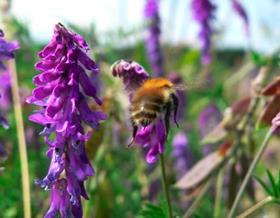
In what is being reported as one of the worst-ever incidents of mass neonicotinoid poisoning of wild bees in the UK, nearly 500 bumblebee queens were found dead and dying on the outskirts of London.
The incident occurred in Havering, East London, next to a field of oilseed rape that, according to Buglife, an organisation dedicated to the conservation of invertebrates, is thought to have been planted with imidacloprid treated seeds in autumn 2013.
The bees were discovered in April, but in the last week, the results of tests by the government science agency Fera have been made public, and show that the bumblebees were contaminated with high levels (c.6 ppb) of the neonicotinoid imidacloprid, and by two types of fungicide, including flusilazole. which will be completely banned in October 2014 due to its toxicity to animals.
Matt Shardlow, CEO of Buglife, said: “This is a timely reminder that despite the partial neonics ban, there are perfectly legal flowering crops, treated with neonics last year, which are still harming our bees.
'New research has revealed that our soils are heavily contaminated with these persistent pesticides, and they are polluting rivers as well. It is essential for the safety of our bees, pollinators and other wildlife that all neonic seed treatment use is suspended.'
Speaking at Fruit Focus in Kent in July, NFU horticulture adviser Dr Chris Hartfield said new research showed that losses of bees and other insect pollinators had slowed down in the last few years, and that there had even been some increases thanks to growers' hard work in introducing biodiversity onto farms.
He also stressed that the problems around pollinators are more complicated than just one area: 'Everyone in bee and pollinator health wants a silver bullet, but you can't point the finger of blame at a single factor,' he said.
'We have not found neonics causing harm to bees in real-life field situations. Farming and horticulture are part of the solution to the problem.'



